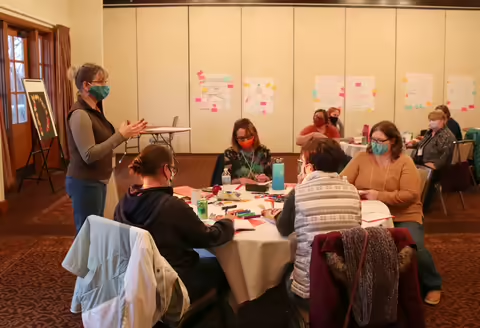
URBANA, Ill. – Diverse ecosystems are healthy ecosystems. Wildlife, plants, and fungi are naturally interconnected and rely on each other. The same is true of those who advocate for the environment – diversity makes them stronger.
The University of Illinois Extension Master Naturalist program is putting intentional effort into diversifying its volunteer workforce and its program outreach. Extension provides science-based training to volunteers to help them become active environmental stewards in their community. Currently, the vast majority of the program's volunteers indicate their race as white and there are limited service projects that specifically engage with communities of color.
The Diversify Master Naturalist Project is taking steps to make the program more inclusive by identifying and removing barriers for participants and checking for biases in its training and programs. The two-year project is led by Joy O'Keefe, assistant professor and Extension wildlife specialist in the Department of Natural Resources & Environmental Sciences.
O’Keefe’s background is in bat research, but when she became an Extension specialist, she recognized the new position was an opportunity to help diversify the study of natural resources.
“As a wildlife biologist, I was acutely aware of a lack of diversity in my field,” O’Keefe says. “The Master Naturalist program is a great way to gain deeper insights into ways that communities of color use natural resources.”
Black, Indigenous, and People of Color (BIPOC) have a long history of encountering danger and systemic racism in outdoor spaces. O’Keefe says American culture excluded these communities from nature by creating negative experiences and preventing access to resources and nature. Due to systemic racism practices, such as exclusionary housing, BIPOC communities are more likely to be impacted by pollution and climate change. However, they cannot advocate for change if they are not included in conservation efforts.
“The beauty of nature is its diversity, and every individual should have opportunities to engage with the natural environment. Our Master Naturalist program is intentionally creating ways to ensure that all people have equal access to meaningful experiences with the natural world,” says Shelly Nickols-Richardson, associate dean and director of Illinois Extension.
The Diversify Master Naturalist project has four initial goals: a year-long training for Extension staff who facilitate the county volunteer programs, engagement with communities of color to create an advisory board that tracks progress, continuing education in diversity training for Master Naturalists, and suggesting changes to the program manual.
To lead the program, O’Keefe collaborated with Ross Wantland, director of curriculum development and education with the University of Illinois Office of the Vice Chancellor for Diversity, Equity and Inclusion.
“With this group, we’ve had the chance to explore from the ground up what structural racism is and what coordinators can do with this knowledge at the county level,” Wantland says.
In January 2021, 20 Master Naturalist coordinators from local county Extension offices committed to the year-long community of practice that included monthly readings, assignments and discussions, quarterly in-depth trainings, and a two-day retreat at a state park. Their curriculum has been shared with Master Naturalist programs in other states.
The pilot group explored racism in the outdoors, personal experiences from people of color, how racism impacts relationships with nature, how to create more racially inclusive programs, and techniques for reaching out to diverse communities.
Extension staff who participated reported an increased level of awareness of the unique issues communities of color face when engaging with the environment and tools to help connect with them.
Abigail Garofalo, Extension natural resources, environment, and energy educator, leads the Master Naturalist program for Cook County along with fellow coordinator Val Kehoe. Prompted by the project, Garofalo and Kehoe mapped where their current volunteers were and use partnerships to build deeper connections in communities they were not reaching.
“Nature is everywhere, and we want to have Master Naturalists in every community in Cook County,” Garofalo says, adding that they were not reaching people in parts of west and south Chicago.
When the time came to recruit volunteers for annual training, Garofalo revisited their marketing materials to make them more representative of the targeted communities and to help make their commitment to diversity clear. She promoted the program in new neighborhoods and made volunteer training more inclusive by offering weekend, evening, and online sessions.
“We’re asking questions about if we’re designing our programs in a way that makes them accessible,” she says, adding that fees and background checks can also be barriers. “If volunteer training is six hours on a weekday, is that accessible to most people?”
The Master Naturalist volunteer training curriculum will also be revised to include more information on barriers to accessing nature and community. Participants recommended that the program should be open to change because its current design does not fit every county.
This project is funded by an Extension Collaboration Grant. First launched in 2018, grants are part of an ongoing effort to connect campus-based researchers and University of Illinois Extension field staff to do applied research projects that will improve the quality of life of Illinois residents. The grants – which focus on addressing critical issues in food, economy, environment, community, and health – returned in 2020. Illinois Extension and the College of Agricultural, Consumer and Environmental Sciences provided 17 grants in the current round of funding with financial support from University of Illinois’ Office of the Provost Investment for Growth Program.
SOURCES: Joy O'Keefe, assistant professor and Extension wildlife specialist Natural Resources & Environmental Sciences Department; Ross Wantland, director of curriculum development and education with the Office of the Vice Chancellor for Diversity, Equity and Inclusion; Abigail Garofalo, Extension natural resources, environment, and energy educator.
PHOTOGRAPH: Available for media use. Credit to University of Illinois Extension.
WRITER: Emily Steele, Media Communications Coordinator, Illinois Extension
ABOUT EXTENSION: Illinois Extension leads public outreach for University of Illinois by translating research into action plans that allow Illinois families, businesses, and community leaders to solve problems, make informed decisions, and adapt to changes and opportunities.
